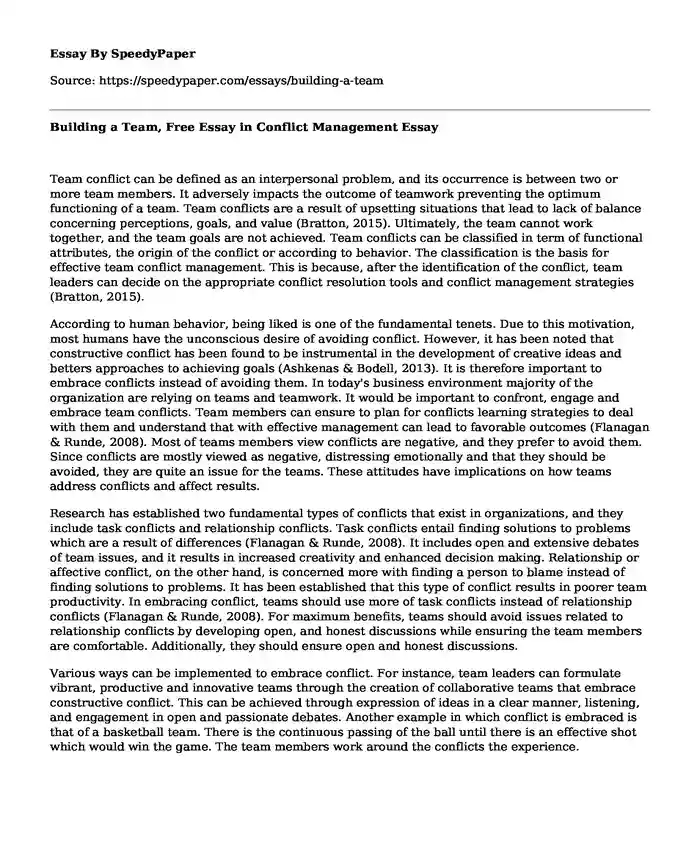
| Type of paper: | Essay |
| Categories: | Conflict management |
| Pages: | 3 |
| Wordcount: | 588 words |
Team conflict can be defined as an interpersonal problem, and its occurrence is between two or more team members. It adversely impacts the outcome of teamwork preventing the optimum functioning of a team. Team conflicts are a result of upsetting situations that lead to lack of balance concerning perceptions, goals, and value (Bratton, 2015). Ultimately, the team cannot work together, and the team goals are not achieved. Team conflicts can be classified in term of functional attributes, the origin of the conflict or according to behavior. The classification is the basis for effective team conflict management. This is because, after the identification of the conflict, team leaders can decide on the appropriate conflict resolution tools and conflict management strategies (Bratton, 2015).
According to human behavior, being liked is one of the fundamental tenets. Due to this motivation, most humans have the unconscious desire of avoiding conflict. However, it has been noted that constructive conflict has been found to be instrumental in the development of creative ideas and betters approaches to achieving goals (Ashkenas & Bodell, 2013). It is therefore important to embrace conflicts instead of avoiding them. In today's business environment majority of the organization are relying on teams and teamwork. It would be important to confront, engage and embrace team conflicts. Team members can ensure to plan for conflicts learning strategies to deal with them and understand that with effective management can lead to favorable outcomes (Flanagan & Runde, 2008). Most of teams members view conflicts are negative, and they prefer to avoid them. Since conflicts are mostly viewed as negative, distressing emotionally and that they should be avoided, they are quite an issue for the teams. These attitudes have implications on how teams address conflicts and affect results.
Research has established two fundamental types of conflicts that exist in organizations, and they include task conflicts and relationship conflicts. Task conflicts entail finding solutions to problems which are a result of differences (Flanagan & Runde, 2008). It includes open and extensive debates of team issues, and it results in increased creativity and enhanced decision making. Relationship or affective conflict, on the other hand, is concerned more with finding a person to blame instead of finding solutions to problems. It has been established that this type of conflict results in poorer team productivity. In embracing conflict, teams should use more of task conflicts instead of relationship conflicts (Flanagan & Runde, 2008). For maximum benefits, teams should avoid issues related to relationship conflicts by developing open, and honest discussions while ensuring the team members are comfortable. Additionally, they should ensure open and honest discussions.
Various ways can be implemented to embrace conflict. For instance, team leaders can formulate vibrant, productive and innovative teams through the creation of collaborative teams that embrace constructive conflict. This can be achieved through expression of ideas in a clear manner, listening, and engagement in open and passionate debates. Another example in which conflict is embraced is that of a basketball team. There is the continuous passing of the ball until there is an effective shot which would win the game. The team members work around the conflicts the experience.
References
Ashkenas, R., & Bodell, L. (2013). Nice Managers Embrace Conflict, Too. Harvard Business Review. Retrieved 15 February 2018, from https://hbr.org/2013/10/nice-managers-embrace-conflict-too
Bratton, V. (2015). Managing Conflict: Your Survival Guide to Successful Negotiation & Conflict Resolution. Montana.edu. Retrieved 15 February 2018, from http://www.montana.edu/business/wcoe/documents/2015/managing-conflict-PPT.pdf
Flanagan, T., & Runde, C. (2008). Hidden potential: Embracing conflict can pay off for teams. Leadership in Action, 28(2), 8-12. http://dx.doi.org/10.1002/lia.1241
Cite this page
Building a Team, Free Essay in Conflict Management. (2022, Mar 01). Retrieved from https://speedypaper.com/essays/building-a-team
Request Removal
If you are the original author of this essay and no longer wish to have it published on the SpeedyPaper website, please click below to request its removal:
- Free Essay Sample on Cultural Issues of Americans, Germans, and Japanese
- Essay Example: An Analysis of Dove Campaign For Real Beauty
- Medicine Career - Personal Statement Essay Sample
- Facing Up The American Dream.
- Free Essay Example. Human or Animal Disease Outbreak
- Essay Sample on Social Class and Inequality
- Essay Sample on Home Depot Company Overview
Popular categories




